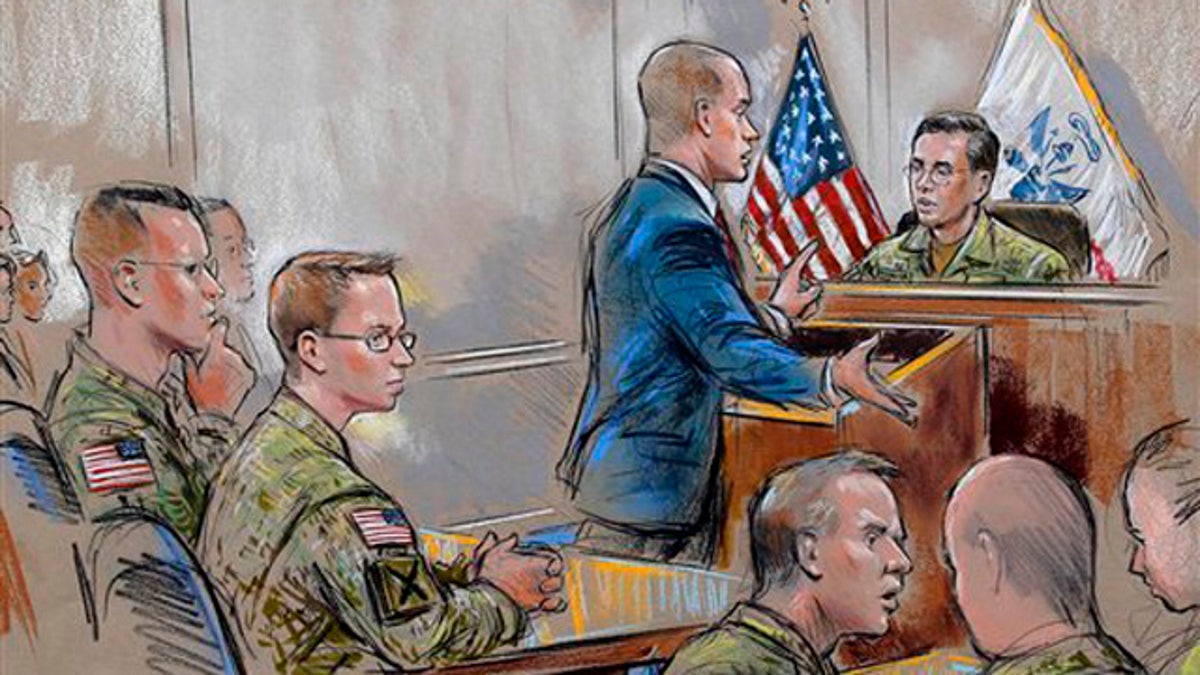
Dec. 16, 2011: In this courtroom sketch, Army Pfc. Bradley Manning, second from left, sits as his attorney, David E. Coombs, speaks during a military hearing in Fort Meade, Md. (AP)
FORT MEADE, Md. – Pfc. Bradley Manning, the 23-year-old soldier accused of providing hundreds of thousands of secret government documents to the website WikiLeaks, appeared publicly Friday at a military courthouse for the first time since being arrested in Iraq 19 months ago.
But the brunt of the procedural jabbing at the hearing at Maryland's Fort Meade was directed not at Manning but the judge in the case -- who found himself fighting to keep his spot on the bench. Defense attorney David Coombs touched off an unusual courtroom debate by asking investigating officer Lt.Col. Paul Almanza to recuse himself due to bias.
Almanza later refused and the hearing adjourned for the day, but Coombs is trying to put the trial on hold in response. The defense attorney has filed a motion to request a stay before the Army Court of Criminal Appeals, though Almanza plans on proceeding with the hearing Saturday unless he is told otherwise.
Coombs claimed Almanza was biased due to his role as a Justice Department prosecutor, and the department's alleged desire to prosecute WikiLeaks founder Julian Assange. He also said Almanza unfairly denied all but two of the 38 witnesses the defense requested who were not in common with the government. Thirdly, Coombs said that the defense was at a disadvantage because the trial was made open to the media.
Finally, Coombs alleged the prosecution had delayed the trial in hopes that damage resulting from the leaked documents would become apparent to the public. But, Coombs said, that never happened.
"Where's the damage?" Coombs said. "Where's the harm?"
After an hour-plus recess following the motion for recusal, Almanza had to answer questions about his impartiality from both the defense and prosecution.
The government prosecutor, Capt. Ashden Fein, asked Almanza if he had ever dealt with any issues related to WikiLeaks or Manning in his prior role as a Justice Department attorney, a job he left on Dec. 12. Almanza told the court he had no dealings with this case prior to his appointment and that he believed he could be impartial.
Meanwhile, Manning sat still for the most part with his hands clasped, at times taking notes.
After only a few questions, the government announced it felt Almanza was fit for trial. "In the end, the United States does not believe you exhibited any biases," Fein said.
The defense took a much harsher line of questioning. "The question is whether a reasonable person believes you could be impartial, not the United States government," Coombs said.
The investigating officer fired back, defending his impartiality.
"The Department of Justice is large," Almanza said. "I'm with (the) child exploitation and obscenity section -- not in any part of the DoJ that deals with Pfc. Manning."
Coombs grew animated as questioning continued, at times stepping away from the microphone and turning to speak directly to the roughly 50 attendees in the courtroom gallery. That move eventually prompted Almanza to ask: "Mr. Coombs, who are you addressing?"
Coombs argued a reasonable person would find a problem with Almzanza's attachment to the Justice Department, given what he described as the department's eagerness to prosecute Assange and Manning. He cited that Almaza continued to send emails from his Justice account even after he left the department.
Manning, meanwhile, appeared calm and healthy, wearing his army fatigues, short hair, and thick, black glasses. He faces over 20 charges and a maximum penalty of life in prison for his alleged crimes.












































